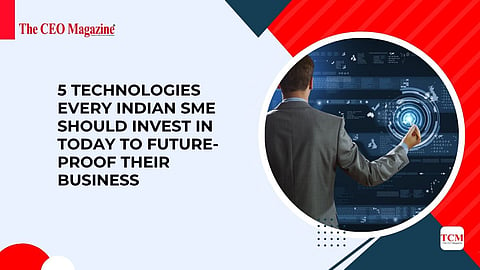
- News
- Women
- Magazine
- IndustryIndustry
- InsightsInsights
- Success Stories
- PublishPublish
- ContactContact
- Media KitMedia Kit

Indian SME
Imagine this:
You’re running a thriving SME in India — product demand is solid, your team is loyal, and your customers are happy. But suddenly, a new competitor disrupts the market with a tech-first strategy. You find yourself scrambling to catch up.
Sounds familiar?
You’re not alone if you’ve felt that rising anxiety.
The business landscape is evolving faster than ever, and the question is no longer “Should we go digital?”
It’s “Are we doing enough to stay ahead?”
In my experience working with hundreds of Indian entrepreneurs and SME leaders, one thing is clear:
Technology isn’t optional anymore. It’s your foundation for survival and scale.
Let me show you exactly where to start.
India is home to 63 million+ SMEs, contributing nearly 30% of the nation’s GDP. But despite this economic clout, many SMEs still lag in tech adoption.
A 2023 NASSCOM report revealed that only 30% of Indian SMEs have digitized core operations. That gap is not just a missed opportunity — it’s a threat to survival.
Whether you're a manufacturing unit in Pune, a textile exporter in Surat, or a retail chain in Bangalore — the right technology can streamline costs, improve customer experience, and unlock exponential growth.
Let’s explore the 5 essential technologies every Indian SME must adopt to build a future-proof business.
“The cloud is for everyone. The cloud is a democracy.” — Marc Benioff, Salesforce CEO
In uncertain times, agility is everything. Cloud computing gives you that.
No more being tied to a physical server or location.
Cloud computing allows you to store, manage, and access your data and apps via the internet, rather than local hardware.
Access business data anytime, from anywhere
Scalable storage without heavy upfront IT costs
Enables remote work and real-time collaboration
Example:
A growing HR consultancy in Jaipur moved their CRM and payroll to Zoho Cloud. Result?
30% reduction in IT overhead and faster client onboarding.
Google Workspace
Zoho One (Made in India!)
Microsoft Azure
AWS for Small Businesses
Here’s the secret:
You don’t need a billion-dollar team to run a smart business.
You just need intelligent automation.
AI tools help automate repetitive tasks like invoicing, customer queries, inventory checks, and even marketing campaigns.
Reduces manpower costs
Improves accuracy and speed
Frees up your team for high-impact tasks
Example:
A Delhi-based ecommerce brand used chatbots powered by NLP to handle 70% of customer support tickets.
Customer satisfaction shot up by 40%, with no new hires.
Customer service (Chatbots like Tidio, Drift)
Inventory and demand forecasting
Email automation (Mailchimp, ActiveCampaign)
Accounting & GST filing (ClearTax, RazorpayX)
“Automation applied to an inefficient operation will magnify the inefficiency.”
— Bill Gates
So make sure your processes are solid before automating.
You might think, “We’re just a small business — hackers won’t target us.”
Think again.
A 2024 report by Kaspersky showed that more than 40% of cyberattacks in India targeted SMEs, not large enterprises.
With data regulations tightening globally and in India (Data Protection Act, 2023), your customer and employee data is a liability — unless secured.
Protects sensitive financial and personal data
Builds trust with customers and partners
Ensures compliance with evolving legal frameworks
Example:
A manufacturing SME in Tamil Nadu faced a ransomware attack. It cost them ₹12 lakhs in downtime and recovery — a crisis that basic firewall and backup tools could have prevented.
Firewalls & endpoint protection (Quick Heal, Norton, Sophos)
SSL certificates for your website
Regular cloud backups
Staff training on phishing attacks
If you're still chasing cheques or waiting days for NEFT confirmations, you're slowing yourself down.
India is leading the world in digital payments adoption — thanks to UPI, GST reforms, and platforms like Razorpay and BharatPe.
Modern fintech tools help you collect, track, disburse, and forecast your money — in real time.
Faster customer payments
Easier vendor payouts
Better visibility into working capital
Example:
A logistics startup in Nagpur adopted RazorpayX for payroll and vendor payments. It saved them 8 hours per week, reduced late payouts, and improved cash forecasting.
Razorpay (Invoicing, UPI, Cards)
Khatabook or Vyapar (Ledger & inventory)
TallyPrime + TallyBank
CredFlow (Receivables tracking)
Bonus: Most fintech tools also integrate directly with your accounting software and GST systems.
In my experience, the fastest-growing SMEs all have one thing in common —
They obsess over data.
Data analytics helps you make smarter decisions by tracking real-time performance across sales, marketing, inventory, customer behavior, and more.
Spot trends and patterns early
Predict demand and optimize inventory
Improve sales conversion and ROI
Example:
A B2B distribution firm in Ahmedabad integrated Power BI with their ERP system.
Within 3 months, they cut overstocking by 25% and improved delivery lead time.
Google Data Studio (Free)
Zoho Analytics (Indian, powerful)
Tableau or Microsoft Power BI
Integrate with Shopify, Tally, or your CRM for live dashboards
“Without data, you’re just another person with an opinion.”
— W. Edwards Deming
You might be thinking, “All this sounds great, but will it cost me a fortune?”
The truth is, tech investments don’t have to break the bank.
Most of the tools mentioned above offer affordable plans tailored for Indian SMEs — some even free to start.
But the cost of inaction?
Lost customers, inefficiency, missed opportunities, compliance risks, and a business that slowly fades into irrelevance.
As a founder or business leader, you’re not just running a company —
You’re designing its future.
And the future doesn’t wait for anyone.
So here’s my challenge to you:
Choose one of these five technologies and implement it within the next 30 days.
Start small, start smart — but start today.
You’ll be amazed at the transformation, not just in your operations, but in your mindset and momentum.
Follow us on Google News
